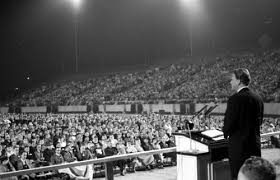Perhaps no one influenced twentieth century preaching like Billy Graham. Certainly, the twentieth century produced some great preachers. Preachers like George Truett, W.A. Criswell, Charles Stanley, Adrian Rogers, and others were used by God to clearly proclaim the Bible. While those men contributed greatly modeling faithful biblical exposition, Billy Graham greatly influenced the way preachers delivered the evangelistic invitation at the conclusion of their sermons. Billy Graham was the modern-day champion of the “altar call.” And, if you grew up in a church like I did, there wasn’t a Sunday that went by that the preacher didn’t give an altar call. Many Sundays, that altar call was accompanied by the great hymn, “Just As I Am.” Every head was bowed, and every eye was closed as Sunday after Sunday, the preacher pleaded for people to give their lives to Jesus. You can thank men like Billy Graham, Billy Sunday, and Charles Finney for popularizing the modern-day invitation that is still used in so many of our churches.
For many of us who watched Billy Graham on television or had the opportunity to attend one of his crusades, images of scores of people walking the aisle and surrendering their lives to Christ will be embedded in our minds for the rest of our lives. While seeing people crowd the stage in response to the Gospel was a powerful image, that powerful time of evangelistic invitation was preceded by powerful preaching. Over the years, I’ve watched many of his sermons online, and I was always amazed by his fiery passion in his younger years, and I was always touched by his gracious and softer tone in his later years. I, like many other preachers, learned much from Billy Graham’s ministry and his preaching. Let me share with you some of the lessons I’ve learned from Billy Graham’s preaching:
(1) Let my words come from His Word
Anyone who has ever heard Graham preach is familiar with his repeated refrain, “the Bible says.” It was obvious in his preaching that the Bible was his source of truth. However, early in his ministry, Graham struggled with the veracity of the Word of God. Charles Templeton, a fellow evangelist and friend of Graham, began to question the truthfulness of the Bible. Templeton challenged Graham’s understanding of the Bible questioning how Graham could believe a book that was so dated. As a thirty-year old man, Graham struggled with Templeton’s challenge, but ultimately came to the conclusion that the Bible was the inerrant Word of God. In his autobiography, Just As I Am, Graham recounted wrestling in prayer with God over this issue until he said to God, “Father, I am going to accept this as Thy Word—by faith! I’m going to allow faith to go beyond my intellectual questions and doubts, and I will believe this to be Your inspired Word.”[1]
The rest of his ministry would be characterized by powerful preaching with the conviction that the Bible is the Word of God that contains the Good News of Jesus Christ. In an age where so many preachers are exchanging biblical preaching for motivational, moralistic pep talks, we need the reminder that there is power in simply proclaiming what the Bible says. I am thankful that one of the most influential men of the twentieth century boldly proclaimed the Bible.
(2) Let Christ be at the center
Graham was laser-focused in his preaching. He was an evangelist, and his goal in every sermon was to point people to the forgiveness and eternal life that they could have in Jesus. Torrey Johnson, a Youth for Christ leader who helped launch Graham’s nationwide preaching career recalled a conversation he had with Graham at the beginning of Graham’s career. Graham said to Johnson, “Torrey, God’s given me one great gift. I have a gift of bringing people to Christ. And that I’ve got to do.”[2]
While you and I might not have the same evangelistic gifting that Graham had, let us pray that we will have the same sense of urgency that Graham had. I hope that as I stand in the pulpit and preach it will be with a longing to see people changed by the power of Jesus Christ. If Christ is the only hope that people have, may we lift Him up so that people might see His glory and be drawn to Him. May Christ be at the center of our teaching and preaching.
(3) Let my message be clear
If you listen to Graham’s sermons, you’ll note their clarity. His delivery was engaging, down to earth, and simple to understand. He didn’t use a lot of notes, and he spoke with much passion and conviction. He didn’t roam around the stage. His movement on stage seemed purposeful, and he seemed to look you straight in the eye. He varied his rate of speech and his tone. He certainly was a gifted communicator.
In all of his giftedness as a public speaker, what I admired most was that Graham was understandable. He didn’t preach over the heads of his audience. He also didn’t preach in a way that insulted the audience’s intelligence. The message was always clear, with pertinent exhortation and application. Many preachers struggle to be clear. We get so caught up in trying to be original or clever that we forget that one of the main goals of public speaking is to communicate the truth in a way that everyone can understand. All of us who communicate God’s Word on a regular basis would be served well to listen to a few of Graham’s sermons to help us learn how to be clear in our own Bible proclamation.
(4) Let my life match my message
Television evangelists tend to have a horrible reputation, and unfortunately, some of that reputation is deserved. You have heard stories of pastors experiencing moral failures and committing extortion that have cast a black eye on Christianity. However, in an age where so many prominent Christian preachers have fallen as a result of poor and sinful choices, Billy Graham managed to maintain his integrity. In recent news, Vice President Mike Pence was criticized for holding to the “Billy Graham rule.” Throughout his ministry, Graham refused to be alone with another woman besides his wife. While that rule seems outdated to many in society, undoubtedly, that kind of commitment to purity helped Graham to maintain his integrity over the years. Simply put, Graham lived what he preached.
Graham’s life is a great reminder that integrity really does matter. It’s one thing to be an eloquent speaker; it’s quite another to live out your convictions on a daily basis. What the church needs are leaders who not only preach Christ but model Christ in their daily walk. I pray that I will be that kind of leader.
Billy Graham was by no means perfect. While Graham was a great evangelist, he was also a great sinner, just like everyone else. However, Graham served a great God who graciously saved Graham and used him for His purpose. As we reflect on the loss of a remarkable man, may we look at his life and be in awe of the God who saved him and used him to reach so many with the good news of Jesus Christ.
**********************
[1] Billy Graham, Just As I Am: The Autobiography of Billy Graham (New York: Harper Collins Publisher, revised edition, 2007), 139.
[2] David Aikman, Billy Graham: His Life and Influence (Nashville: Thomas Nelson Publishers, 2007), 294.




